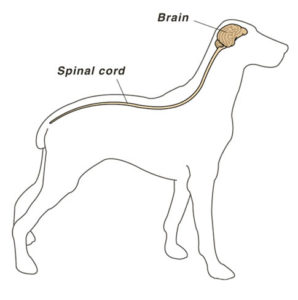Listen to this post |
I recently had the owner of a 12 year old large breed dog reach out to me about her dog that has a painful back and progressing paresis (neuromuscular dysfunction) both rear legs. She is convinced that the source of her pain and paralysis stems from a reaction she had to a rabies vaccine in the months that followed administration of the vaccine. The general veterinarian, as well as a neurologist she saw were not convinced, since paralysis from a rabies vaccine is very rare and neither had ever seen it.
Far more commonly with a presentation like this we are dealing with a compressive intervertebral disc injury of the spine. In fact, I often have weeks where I do not go one day without seeing at least one compressive intervertebral disc case, yet in 16 years of practice and several thousands of administered rabies vaccines, I have not seen one case of rabies post vaccinal paralysis. To be fair, however, that is not to say that it does not exist and I was able to find a few isolated cases after researching veterinary college abstracts and case reports on the Veterinary Information Network. The lengths to which I had to go to find them, however, just speaks to the rarity of something like this to occur.
Undeterred by the veterinarian and veterinary neurologist, the lady that had reached out to me had previously contacted an integrative veterinary practice in NY that assumed that her “diagnosis” was correct and offered her high dose antioxidant intravenous fluid therapy that in their experience has worked well for this condition. She was very impressed by this practice because they are known for treating the pets of celebrities and billionaires, but since they are so far away, she asked if I would be willing to treat her dog with their recommended protocol.
Upon review of the records and in hindsight of all I have learned about this dog’s case, I am left not nearly so impressed as this dog owner is. Celebrities and billionaires liking something first of all hardly impresses me. I can come up with many examples of individuals and businesses that are good at little else than relieving rich people of their money. I also have major concerns that a clinic that has not yet even laid their hands on a dog would be so quick to conclude that she is afflicted with an exponentially less common disease process than the suspected conclusions of veterinarians that actually examined the patient (including a specialist).
Herein lies the issue that many traditional main stream veterinarians have with veterinary alternative practitioners. Just because a practitioner favors more natural approaches to treating disease does not mean that one should ever forgo the diagnostic process; yet many do. No matter how we choose to treat the patient we need to first have a reasonable certainty of what we are actually treating. In this article’s case example, there would seem little down side to infusing a patient with safe, water soluble antioxidants and fluids, yet by foregoing routine diagnostics, we would risk missing potential opportunities to help this patient and utilize an owners’ resources optimally toward therapies that may actually work.
Thus, a veterinary practitioner that favors alternative medicine but disregards or minimizes the value of diagnostics is not an “integrative practitioner.” A true integrative practitioner relies on traditional physical examination and diagnostics to draw conclusions to formulate treatment plans. For example, as a known integrative veterinary practitioner in my area, I commonly get second opinion cases for acupuncture and laser therapy for pet owners seeking an alternative to surgery for ligament tears and dislocations. If I confirm that a joint is indeed torn I tell the client under no uncertain terms that without surgical correction first, it will not be possible to laser and/or acupuncture our way out of the reality that the joint is unstable. On the other hand, following a successful surgery to stabilize, we can reduce post-operative pain with less reliance on opioids and NSAIDs, speed recovery and prevent future re-injury using acupuncture, laser and other alternative modalities.
Dr. Roger Welton is a practicing veterinarian and highly regarded media personality through a number of topics and platforms. In addition to being passionate about integrative veterinary medicine for which he is a nationally renowned expert, Dr. Welton was also an accomplished college lacrosse player and remains to this day very involved in the sport. He is president of Maybeck Animal Hospital , runs the successful veterinary/animal health blogs Web-DVM and Dr. Roger’s Holistic Veterinary Care, and fulfills his passion for lacrosse through his lacrosse and sport blog, The Creator’s Game.



